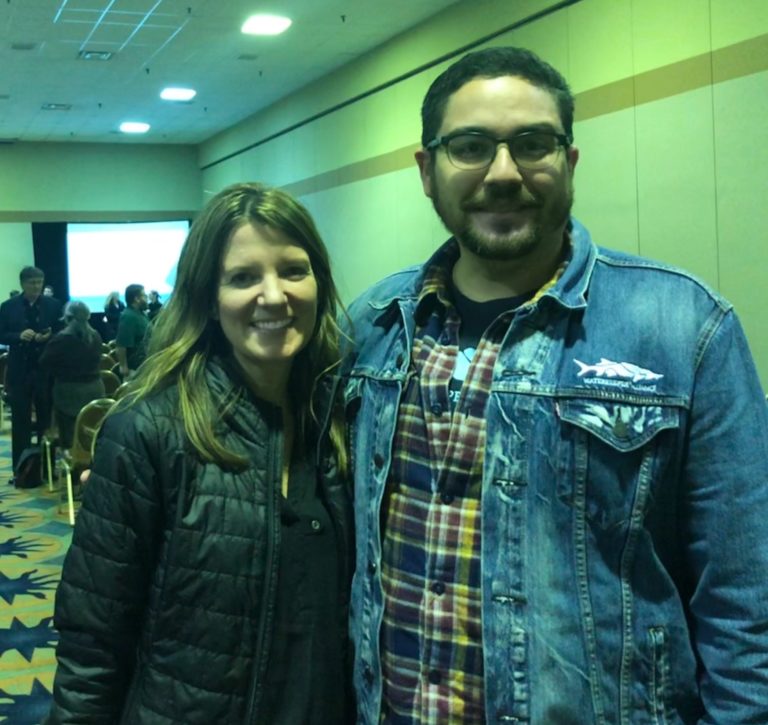Statement of Lake Worth Waterkeeper Reinaldo Diaz to EPA on Redefining Waters of the U.S.
By: Lake Worth Waterkeeper

Missouri Confluence Waterkeeper Rachel Bartels (left), Kansas Riverkeeper Dawn Buehler, and Lake Worth Waterkeeper Reinaldo Diaz (right) braved icy roads to testify in Kansas City on Feb. 28 at the only hearing EPA is hosting on its proposed redefinition of Waters of the U.S., a change that would strip waters around the country of Clean Water Act protection.
Read comments by Reinaldo Diaz, J.D. Lake Worth Waterkeeper, below:
As your Lake Worth Waterkeeper, I advocate for the Lake Worth Lagoon and its watershed, a coastal estuary running along the eastern edge of Palm Beach County in South Florida. The watershed, which is considered the northern reach of the Everglades, extends from Lake Okeechobee to our famous beaches.
Not too long ago, the water traveled mostly underground and through wetlands; at that time the Lake Worth Lagoon was a freshwater lake. As more people moved into the area, we began to change this drastically. We cut inlets to the Atlantic Ocean, creating the coastal estuary. Around this time, we built an extensive canal system to drain much of the wetlands for homes and farms.
We have profoundly changed our environment, but much of the original wetland remains interspersed throughout our watershed, and the canals (or ditches as you call them) have replaced much of the underground connection between these wetlands.
Just like its original natural setup, many of the hundreds of canals in this system are not always filled with water. They remain empty until days like two days ago, where we receive seven inches of rain in less than a day. These canals then do their job and bring this water to the many wetlands or into our Lagoon. This system serves as the critical lifeblood between these wetlands, most of which are inhabited by rare and protected species.
Since these canals are meant to keep our human habitats dry, they can be found running right through our neighborhoods and businesses. Under the proposed Waters of the United States change to the Clean Water Act, most of these wetlands and their connections will lose protection.
This will be a catastrophe for our community.
Over the past 30 years, Florida has taken an anti-regulation philosophy, which has left us with toothless state water quality standards. Federal protections like the Clean Water Act are often our only chance at fighting polluters. Losing this protection would strip our wetlands of vital protection, allow polluters to go unpunished, and ultimately subject our community to massive health risk and economic loss.
There will be a lot of angry people in our watershed — 1.7 million of them — if their backyards are polluted because of this change. Among them: The agriculture industry, which dominates the western half of our county, with sales totaling $1.4 billion last year. Our county is the leader in agriculture sales east of the Mississippi, and in the top ten nationally. The marine industry based in our lagoon is worth $2 billion. Real estate is another massive economic driver: Along the shores of our Lagoon, you can find Mar-a-Lago, just one example of the type of development that would be affected by this rule change.
And then there’s tourism, an $7 billion-plus industry in our watershed. People come here from all over the world to fish, dive, or enjoy lazy beach days. That’s a lot of money in a small area: Our Lagoon is only 21 miles long, and a mile wide at most.
It’s no coincidence that these industries depend on clean water. And you’ll find the scenario I describe applicable to any watershed in Florida, whether it’s the St. John’s River, Indian River Lagoon, Biscayne Bay, Caloosahatchee River, Tampa Bay, Suwannee River, Apalachicola River, etc.
The entire state of Florida will suffer if this proposal is adopted.
In Florida, water is literally the ground beneath our feet. Taking this away from us would ruin our health, our livelihoods, and our culture. So we ask you to abandon this proposal because the environmental, economic, and health risks would never be justified.
*****
You can defend our waters by submitting comments about the proposal to gut the Clean Water Act below.